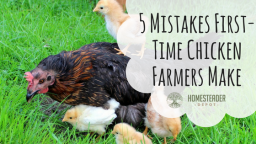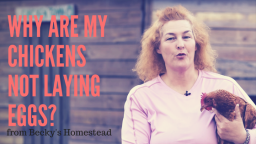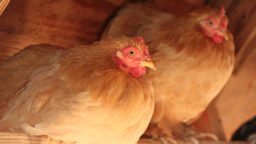When it comes to homesteading of all kinds, trial and error is a great way to learn. However, when you’re raising animals like chickens, you probably want to reduce the possible mistakes you can make.
If you’re considering starting your own chicken flock, you’ll want to do it right. We’ve got a list of five common mistakes people make when they first start keeping chickens to help you avoid making them yourself.
1. Not protecting against predators
Like a fox in a hen house, many predators out there, depending on your region, will see your chickens as a delicious, juicy, jackpot. When you set yourself up with a coop or enclosure, make sure you know which animals in your area would like to get their hands (or paws, or claws…you know what I mean) on your chickens, and research which kind of barricade will keep them out the best.
And be prepared by a threat from land, sky, even underground, in some cases. Hawks, foxes, coyotes, skunks, raccoons, weasels, bobcats, hawks, and even rats and domesticated dogs and cats, will have their eyes on your chickens, so secure accordingly. Having a guard dog that is trained not to harm the chickens themselves can greatly reduce the threat to your chickens, but you’ll also have to be realistic about a bit of trial and error here, as sad as it is. You might have to learn the hard way at some point that a predator might still be able to penetrate your barriers, so when you first start a flock, mentally prepare yourself for the possibility of this. It might cost you a few chickens, but learning the hard way is still learning.
2. Failing to check local laws
Predators aren’t the only creatures that pose a threat to your chicken-raising operation; bureaucrats do too! Before you even begin to think about planning to raise chickens, check your local ordinances first. Not just zoning laws, but local homeowner’s associations as well. This will mostly apply to urban and suburban homesteaders, particularly if you live in some kind of gated community or apartment or condo complex. But even if you own your own home and have a decent-sized yard, there still might be strict regulations regarding the raising of poultry. If you are a homesteader on your own property, this is unlikely to affect you much, but you should check anyway, just to be safe, particularly if you plan on selling your eggs, meat, chicks, or chickens at any point.
NEVER Buy Laundry Detergent Again>>>
3. Not preparing for injury or sickness
Chickens are creatures like any other and are subject to injury or illness. There are a number of conditions that can affect birds, such as skin conditions on their feet, mites or pocks, thrush, botulism, cholera, and one you’ve probably heard of quite a bit in the news: bird flu.
Familiarize yourself with common bird conditions, join local forums for chicken farmers so you know what’s in your area, and get yourself a good chicken first aid kit. There are a lot of great natural remedies for less severe conditions, as well as more conventional remedies you can stock up on beforehand to be prepared. You’ll also have to prepare yourself, at least mentally, for the possibility of having to separate a sick or injured bird from the flock; a simple dog or rodent kennel can work great for this but keep in mind that chickens can sometimes attack a sick or injured bird, so you’ll have to read up on re-introducing them to the flock.
4. Taking on too many chickens
Just because you have an established flock and a good coop doesn’t necessarily mean you’re equipped to take on new hens a neighbor or friend might be giving away. The size of your coop absolutely has to be appropriate for the number of chickens you have, and two or three extra can create cramped, unpleasant living conditions for all the chickens.
When you set up a coop, make sure you’ve got enough space for each chicken. 5 sq feet per bird is a standard recommendation, not to mention enough a roost and nesting box for each hen (they only sleep in their nesting boxes when they’re sitting on eggs, otherwise they like to perch). If you want to be equipped for extra hens further down the road, and this is quite prudent if you plan on raising more chickens, set yourself up with a coop that can easily be added to and expanded on.
5. Starting with chicks
It’s quite standard to start with chicks when you’re beginning a flock, and many farm supply stores sell freshly hatched chicks, along with feeders, water bottles, and heat lamps to keep them warm. While certainly millions of chickens have been raised just fine like this, if you want to go an easier, cheaper, and more sustainable route, just get hens and a rooster. This might cost more money up front than a few chicks, but you’ll need fewer supplies, and, well, if you get a rooster, your chickens will be making their own chicks, for free, in no times.
The thing is, hens take care of baby chicks infinitely more efficiently than humans do. All the gadgets people buy to raise up chicks are just meant to imitate what a mama hen will do for them instinctively. For the price of some chicken feed, you’ll get something much better than a heat lamp that’s totally sustainable: a hen to sit on the chicks when they’re cold, and direct them to food and water, not to mention keep track of them all day while you tend to all your other homestead tasks.
If you let your hens raise up their own chicks, keep in mind you’ll still need to make sure there’s feed small enough for the baby chicks, and a water container they’re able to access, but otherwise, the mama will do the work for you.
Hope this helps you prepare for chickens and avoid some common mistakes!
Power Efficiency…This Simple Device Will Change the World Forever>>>



